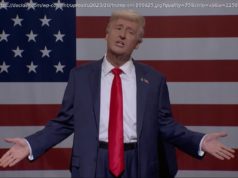„Better U.S.-Russian relations may enable cooperation among all Arctic nations,“ Mike Sfraga, former U.S. envoy to the Arctic, told Newsweek.
As President Donald Trump and his Russian counterpart prepare to hold what has all the makings of a historic summit in the far north frontier that nearly connects their two nations, Europe’s deadliest conflict since World War II is just one of the issues that will come to define what the U.S. leader described as a „chess game.“
The two men’s encounter in the Arctic will take place at the nexus of historic, strategic and geopolitical trends that define one of Earth’s most contested regions—a source of both tension and, potentially, new cooperation between Washington and Moscow.
Republican Alaska Governor Mike Dunleavy, who will soon meet Trump ahead of the high-stakes summit at Joint Base Elmendorf-Richardson in Anchorage, said the meeting has the potential to not only be „great for Alaska“, but „if some just peace can come out of these discussions, that would be great for the world.“
„With regard to a better relationship with Russia, obviously a better relationship means that the rhetoric has ratcheted down“, Dunleavy told Newsweek on the eve of the summit. „We can get back to cooperating on the Arctic through the Arctic Council and other groups that look at the future, what the Arctic is going to look like in terms of its politics, its resources, etc.“
„Also, they’re two and a half miles away from us. They’re very close to us“, he added. „So anytime that you can have decent relationships with a neighbor that close bodes well for everyone.“History in the Making
When Putin arrives in Alaska, he will become the first Russian leader to ever set foot in the territory once held by the Russian Empire more than 150 years ago. Still today, the state is home to a small community of ethnic Russians and a sizable community of Indigenous people who trace their history across the Bering Strait.
The U.S. purchase of Alaska—for the modern equivalent of around $129 million—came at a critical time for both nations.
Czar Alexander II sought to bolster his economy by selling off indefensible territory following the devastating Crimean War fought against a great power alliance that included France, the United Kingdom and Ottoman Empire. U.S. President Andrew Johnson was dealing with the costly and politically contentious era of post-Civil War Reconstruction, leaving Secretary of State William H. Seward to pioneer the acquisition.
The deal drew criticism at the time, widely ridiculed as „Seward’s Folly.“ His vision, however, would be justified over time, first by the discovery of gold, then oil and finally, the strategic position that Alaska would ultimately hold as technological advancement globalized conflicts and allowed greater access to the once inaccessible waters of the Arctic.
Having been the site of Japan’s only North American invasion during World War II—a conflict in which Washington and Moscow banded together against common foes—and later a crucial front line in the Cold War between the U.S. and Soviet Union, Alaska awaits both Trump and Putin at a new crossroads in history.
„It is undeniable that this meeting is historic“, Mike Sfraga, who served as the first U.S. ambassador-at-large to the Arctic, told Newsweek.
„Since the United States purchased what is now the state of Alaska from Russia in 1867“, Sfraga said, „we have navigated nuanced and dramatic swings in our relationship, from allies during World War II, to intense adversaries during the Cold War, to cautious partners, to competitors once again—but today we are in a far more complicated geopolitical landscape.“
„If a fair and enduring peace in Ukraine can be achieved“, he added, „better U.S.-Russian relations may enable cooperation among all Arctic nations so together they can address the pressing challenges and opportunities present throughout the region.“
Sfraga, who serves as interim chancellor of the University of Alaska Fairbanks, said that his institution „is well positioned to participate and perhaps lead in some of these efforts when the time and conditions are right.“A New Great Game
Just days before Russia launched its invasion of Ukraine on February 24, 2022, Sfraga, then-President Joe Biden’s nominee to chair the U.S. Arctic Research Commission, expressed his concern to Newsweek over the potential loss of critical U.S.-Russia cooperation in the Arctic.
Three and a half years later, he warns that „the war on Ukraine and its impacts throughout Europe and the globe demand the world’s attention and a commitment to ensure territorial integrity, the rule of law, and the international rules-based system“, and that „the Arctic region is not divorced from these geopolitical realities.“
In fact, Sfraga argued that „we already see the growing importance of the Arctic playing out in the interests, aspirations, activities, and conflicting worldviews of the world’s great powers, the United States, Russia, and China.






